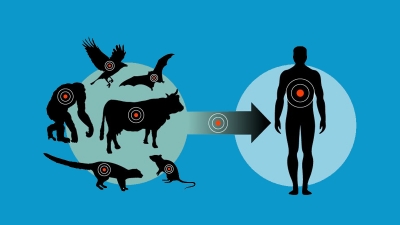
Also known as zoonotic disease, zoonosis refers to the disease that humans contract from animals, including mammals, birds, reptiles, amphibians, and fish. Both wild and domestic animals can transmit a disease to humans, and the transmission can happen in different ways. Bacteria, viruses, parasites, and fungi are all agents of zoonotic diseases. Climate change and changing landscapes are expanding the range of infectious and zoonotic diseases, which were once confined to warmer regions.
Animals can sometimes carry harmful germs that can spread to people and cause illness – these are known as zoonotic diseases or zoonoses. Zoonotic diseases are caused by harmful germs like viruses, bacterial, parasites, and fungi. These germs can cause many different types of illnesses in people and animals, ranging from mild to serious illness and even death. Animals can sometimes appear healthy even when they are carrying germs that can make people sick, depending on the zoonotic disease.
Zoonotic diseases are very common, both in the United States and around the world. Scientists estimate that more than 6 out of every 10 known infectious diseases in people can be spread from animals, and 3 out of every 4 new or emerging infectious diseases in people come from animals. Because of this, CDC works 24/7 to protect people from zoonotic diseases in the United States and around the world.
How do germs spread between animals and people?
Because of the close connection between people and animals, it’s important to be aware of the common ways people can get infected with germs that can cause zoonotic diseases. These can include:
Direct contact: Coming into contact with the saliva, blood, urine, mucous, feces, or other body fluids of an infected animal. Examples include petting or touching animals, and bites or scratches.
Indirect contact: Coming into contact with areas where animals live and roam, or objects or surfaces that have been contaminated with germs. Examples include aquarium tank water, pet habitats, chicken coops, barns, plants, and soil, as well as pet food and water dishes.
Vector-borne: Being bitten by a tick, or an insect like a mosquito or a flea.
Foodborne: Each year, 1 in 6 Americans get sick from eating contaminated food. Eating or drinking something unsafe, such as unpasteurized (raw) milk, undercooked meat or eggs, or raw fruits and vegetables that are contaminated with feces from an infected animal. Contaminated food can cause illness in people and animals, including pets.
Waterborne: Drinking or coming in contact with water that has been contaminated with feces from an infected animal.
What can you do to protect yourself and your family from zoonotic diseases?
People can come in contact with animals in many places. This includes at home and away from home, in places like petting zoos, fairs, schools, stores, and parks. Insects, like mosquitoes and fleas, and ticks bite people and animals day and night. Thankfully, there are things you can do to protect yourself and your family from zoonotic diseases.
Keep hands clean. Washing your hands right after being around animals, even if you didn’t touch any animals, is one of the most important steps you can take to avoid getting sick and spreading germs to others.
- Always wash your hands after being around animals, even if you didn’t touch the animals.
- Many germs are spread by not washing hands properly with soap and clean, running water.
- If soap and water are not readily available, you can use an alcohol-based hand sanitizer that contains at least 60% alcohol.
- Because hand sanitizers do not get rid of all types of germs, it is important to wash your hands with soap and water if they are available.
- Know the simple things you can do to stay safe around your pets.
- Prevent bites from mosquitoes, ticks, and fleas.
- Learn more about ways to handle food safely—whether it’s for yourself or your family, your pet, or other animals.
- Be aware of zoonotic diseases both at home, away from home (such as at petting zoos or other animal exhibits), in childcare settings or schools and when you travel.
- Avoid bites and scratches from animals.
Credit : Centers for diseases control and preventions
Picture Credit : Google


